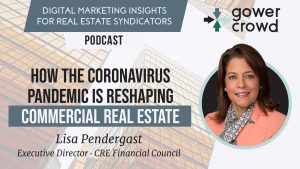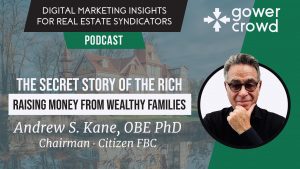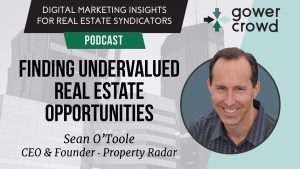Rod Khleif - Director at Lifetime CashFlow Academy
The Man Himself
What You're Going to Learn
- The importance of mindset in achieving success
- Who the most successful people on the planet are
- How to prepare when the next financial crisis hits
- Why it's all about the cash flow
- Everything you need to know about an asset before you invest
Related article: The Ultimate Guide to Crowdfunding Real Estate Development
Listen To or Watch the Full Podcast Here
Show Highlights
FOR REAL ESTATE DEVELOPERS
THE WHITE BOARD WORKSHOP
Learn the exact system best of class sponsors use to raise money online.
The Importance of Mindset in Achieving Success
Rod Khleif: I was a broker, right when I turned 18. And so, my first year in real estate, I maybe made about $8,000. My second year, maybe $10,000. But my third year, which was 1980, I made $100,000. Which, you know, as you know, back then was pretty decent money for a punk kid like myself. So what happened between year 2 and year 3? And what happened was, I met someone that taught me about the importance of mindset and psychology and how truly 80-90% of a person's success, in anything, is just that - mindset and psychology. If it was only knowledge, there'd be a bunch of wealthy librarians and college professors out there. It's the do. It's the taking action with what you know. And so, fast forward to today, I've owned 2,000 plus houses that I rented long term, in three states. I've owned thousands of apartment units. I've actually built 27 businesses. I don't call them failures, when they fail. I call them seminars. Several have been worth tens of millions of dollars. Most were spectacular flaming seminars. But anyway, in 2006, my net worth went up $17 million while I slept. And you think, eww, well, so did I. I thought I was a freakin' real estate god. And, my head got so big I could barely fit it through the door. And you know when that happens? God of the universe might give you a little smack. Well, that was 2008. I lost everything. I lost $50 million, conservatively, in 2008-09. And so, you know, what I'm known for, really, is talking about, you know, the mindset associated with having $50 million to lose in the first place and then the mindset it took to recover from that. People threw themselves off of buildings and killed themselves for less, you know, in the Great Depression and even in this recent contraction. But you know, that's my story. And yeah, I love my team. I've got an incredible team of social media. My podcast - Lifetime Cashflows been downloaded 11.5 million times. I'm really proud of that. It's funny. You want to make God laugh? Tell him your plans. I never planned to do anything about - I do coaching and teaching and live events and sold-out live events. You know, now finally back to live events again. But, you know, early on in my podcast, if you listen to early episodes, you hear me say, I'll never sell you anything. I just want to add value, which is truly what I want. I just want to tell my story about what happened in '08 and '09 and why it happened. And now I'm a liar because, like I say, I have coaching and courses and everything else. But anyway, that's a very abbreviated version of my story.
The Most Successful People on the Planet are the Ones That Add the Most Value
Adam Gower: I don't know. I just had a look online over hear. A quick glance at your LinkedIn. You weren't a digital marketing master pre-2008, so something shifted during that time that got you back into real estate despite the pain but also took you down the path of digital marketing.
Rod Khleif: Let me expand on what you said. It's very interesting and I will tell you, you know. I didn't go - I was out of real estate in 2008 and '09. I formed a company - a litigation support company that helped families save their homes. I built law firms in 5 states. We helped thousands of families save their homes, but I hated the business. It was a, you know, nobody's happy when they're losing their house and it, you know, and so luckily, I was able to sell that a couple of years ago. But that's what I built out of the ashes of losing everything was that litigation support company. It ultimately had 60 employees. It was about a $10 million company. But, you talk about digital marketing and I'm going to tell you, you know, again, I was telling you, like I say, you want to make God laugh, tell him your plans. I never planned to start my podcast and my friend talked me into it and I said, you know what? I'll add value. I'll focus on adding value. That's all I want to do. And so, I would take free phone calls from listeners. I'd say, you know, let's talk about anything you want for 30 minutes. I have nothing to sell. I just want to help you. And I took hundreds of those. And you know, I really believe that the most successful people on the planet are the ones that add the most value and I live by that adage. I mean, literally, since I've been doing this, these are the books I've written. You can see there's about a foot - 12 inches of books here that have been written, you know, and I'm always continually adding more value. And that's - you ask why this social media has been such a success. People see that. When you're not trying to sell, you're educating and you come at it from that place. They see that, they appreciate it, and they follow you.
How Do You Prepare When the Next Financial Crisis Hits
Adam Gower: What did you learn?
Rod Khleif: Yeah, great question.
Adam Gower: The last downturn when you lost $50 million that is going to help you avoid ending up in the same place when the market turns. As, you and I know it's going to do, eventually.Rod Khleif: Of course it will. Of course it will. What am I doing to get ready? Yeah. What am I doing to get ready? I'm going to tell you. In a crisis, cash is king. Okay? So, I'm getting in a lot of cash right now. I am, and I'm getting in more. Also, it's not just your own cash. Your ability to raise equity is also critical. So I'm reframing my investors to say, Hey, you know, we're going to have a pullback. I think it's inevitable. Real estate goes through cycles. I've been through some big ones, like you. You know, the SNL thing, the '08 thing and so, you know, it's inevitable. Real estate goes through seasons, just like life. And right now, we've been in summer for a long time. I'm convinced we're in fall and what comes after fall, right? So, you know, that said, it's not something to fear. Something to get excited about, frankly, because with crisis comes opportunity and there will be incredible exponential opportunities.
Its All About Cash Flow
Adam Gower: Important thing to look at. If somebody is sitting there today, who started in 2012. They've not been through it. They've got a nice portfolio. What is the one thing that they should pay attention to right now?
Rod Khleif: It's all about cash flow, Adam. I mean, listen. In in '08 - '09. I believe the average contraction in income was about 11%. So, can you survive that? Like this San Antonio asset - the day we closed, it could break even at 58% occupied. The day we closed. And it was 96% occupied. But that's the break-even point we had. That is super conservative, right? And so, you know, I've got, 6-8 months of operating reserves in the bank, just in case. I'm not touching that money.
Learn Everything About an Asset Before You Invest
Adam Gower: What's the most important - somebody thinking about investing in real estate today should be thinking about? What' the advice you would give them?
Rod Khleif: Number one. I would say, don't dabble. Okay? If you're going to give your hard-earned money to anybody, learn what it is you're investing in. Be it the stock market. Be it IPOs. Be it somebody's business. Multifamily - for God's sakes, come spend some time with me. You'll know more than most people and that way you're not making a mistake. I mean, start with these GP questions. But. I would encourage you to learn what it is that you're going to invest in. At least at a high level. Because, you know, again, there are a lot of operators out there that are running fast and loose, and you see these 25% IRRs and I'm like, yeah, whatever, okay? Just wait it, we'll see how much they really get, if at all. And so, you know, it's so important to have some basic understanding. So when you see a PPM, you can look at it and say, OK, now this is, you know, B.S. OK, we know this is ridiculous. Their vacancy rate hasn't gone up while they're doing their reposition. Their maintenance and repair budget is a joke. Their payroll budget is a joke, and you'll have a really good understanding of what should be there.
Related to this episode:
A guide for remote workers
How to Setup a TV Studio Quality Home Office















